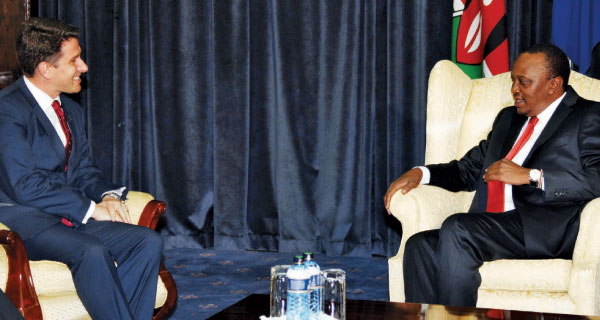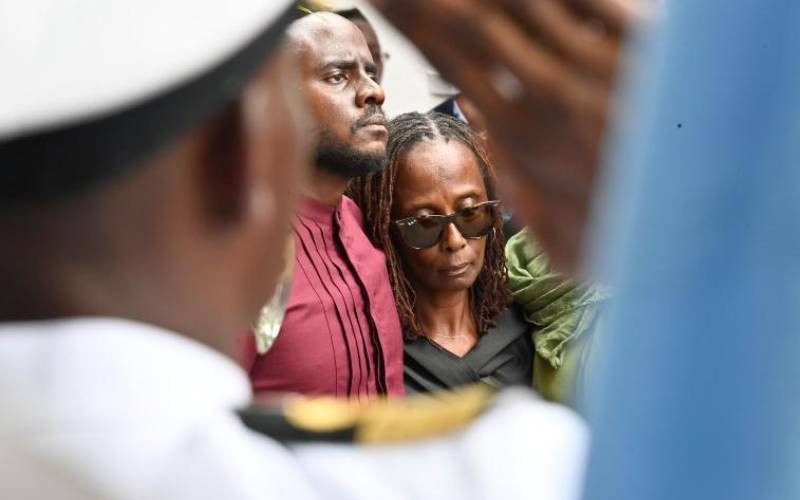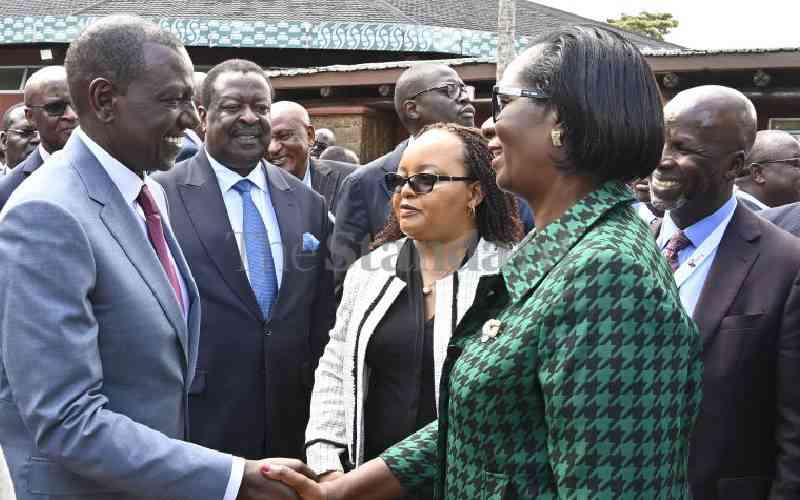 |
|
President Uhuru Kenyatta meeting British Ambassador to Kenya Christian Turner. BELOW: Uhuru speaks to Foreign Affairs Cabinet Secretary Amina Mohamed and Attorney General Githu Muigai during the African Union Heads of state Summit in Addis Ababa in October. [PHOTOS: FILE / STANDARD] |
LILLIAN ALUANGA-DELVAUX
[email protected]
Kenya has put up a spirited fight for deferral of cases at the International Criminal Court (ICC). As the nation awaits the United Nations Security Council’s verdict on the matter, there is debate on whether what began in 2009, with the ICC assigning the Kenyan situation to Pre-Trial Chamber II, could have an impact on the country’s foreign policy.
President Uhuru Kenyatta, Deputy President William Ruto and Journalist Joshua Sang are on trial at The Hague over their alleged masterminding of the 2007/2008-post election violence.
“Kenya’s cases at the ICC marked a turning point for our foreign policy and will likely prompt its review,” says United States International University Lecturer David Kikaya.
Prof Kikaya, an International Relations lecturer, says ICC will, to some extent, become a player in the country’s foreign policy projections, given events that have followed indictment of her nationals. “The ICC has made Kenya intensify her lobbying prowess as witnessed by the ‘shuttle diplomacy’ missions undertaken by former Vice President Kalonzo Musyoka, and events at the African Union meetings in Addis Ababa,” says Kikaya.
Prof Kikaya served in various capacities in the Foreign Affairs Ministry for 20 years. Kenya’s lobbying at continental level appears to be paying off with media reports indicating that up to 40 countries have written to the UN Security Council seeking a deferral of the Kenyan cases at the ICC.
International oversight
“The country’s perceptions to and of the ICC have changed and there are now three categories that can be used to classify this. One group believes ‘it has nothing to do with the cases’, another is of the opinion ‘that Kenya should be cautious when becoming signatories to organs like the ICC, while others favour Kenya strengthening her relationship with such international oversight organs,” says Kikaya.
The challenge, says Kikaya, is allowing reconciliation of these perceptions to come up with a consensual foreign policy. Kikaya points to the approach taken by the Foreign Affairs ministry on the matter terming it an ‘evolution of tact’ for a ministry that has become more visible. “The situation has required the ministry to be a little more outgoing with information since the opposite of this would have elicited criticism,” says Kikaya.
Ambassador Zaddock Syong’oh, however, argues that the ICC cases have nothing to do with issues related to Kenya’s foreign policy.
“The issue here is the appropriation of a prosecutorial approach to all cases despite there being other mechanisms like alternative dispute resolution, mediation, reconciliation, arbitration and reparation that can also be employed,” says Mr Syong’oh, the policy advisor at the Ministry of Foreign Affairs and International Trade.
He cites Gacaca courts in Rwanda and South Africa’s Truth Justice and Reconciliation Commission as examples of mechanisms used effectively. Syongo also disagrees with the notion that Kenya’s stand on the ICC has affected her relationship with the West and seen her embrace a more ‘African centred’ foreign policy.
“We have absolutely nothing against the West. What we are against is an unjust system on prosecutorial matters. This isn’t a question of policy change but overall the acknowledgement that political, economic, and social scenarios have shifted in the last decade. Everybody including the US, Britain, France and Germany are diversifying in their engagement on these issues. We, too like other nations are broadening our engagement and doing so with other nations like Turkey or China doesn’t mean we have abandoned the West,” he says. The nation’s leaders have in the past lashed out at the West over its stand on the ICC cases and considered it an attack on her sovereignty when US Assistant Secretary of State for African Affairs, Jonny Carson said the country’s choices at the ballot would have consequences. The Director at the Institute of Diplomacy and International Relations studies at the University of Nairobi, Prof Maria Nzomo, says there is often a mix-up when talking about the nation’s sovereignty and trials facing individuals at the ICC.
Stay informed. Subscribe to our newsletter
“The UN Charter grants states rights as sovereign member states which means the principle of sovereignty is not in dispute and is universally accepted,” she says.
While pointing out that it is within a nation’s right to have differences with other member states it may consider ‘imperialist’, such views should not be confused with arguments against the ICC. “The ICC does not prosecute states but individuals,” she says, adding that Kenya’s best bet at having the cases deferred is to lobby the permanent members of the UN Security Council.
Syongoh argues that the ‘African solidarity’ exhibited on Kenya’s ICC cases, particularly at the AU summit, isn’t unique and was also exhibited when the continent was fighting colonialism and apartheid in South Africa.
Non-Aligned Movement
“Kenya is a critical and strategic player and globally recognised as such. We have simply become bolder and more articulate on issues and that’s the approach we should be taking on issues,” he adds. Human rights lawyer Harun Ndubi however says it’s difficult to pinpoint exactly what and if Kenya has had a well documented Foreign Affairs policy.
“In the early 80’s Kenya was part of the Non Aligned Movement that many developing nations joined. To date Kenya still has no clearly defined foreign policy because our global interests vary from time to time,” he says.
The Non-Aligned Movement refers to a group of States not formally aligned to any major power bloc. The ‘confusion’, argues Ndubi is further compounded by the international treaties Kenya has signed that show the country is clearly aligned to the West.
“The mixed signals we are now getting from the leadership began during former President Mwai Kibaki’s tenure when he started warming up to China.
But the fact remains that while the Government’s policy may shift, the State’s foreign policy is pro-West and is unlikely to change soon given how our structures and systems are organised,” he says. He says even though the ICC cases may interfere with that relationship, it would only be in the short term.
 The Standard Group Plc is a
multi-media organization with investments in media platforms spanning newspaper
print operations, television, radio broadcasting, digital and online services. The
Standard Group is recognized as a leading multi-media house in Kenya with a key
influence in matters of national and international interest.
The Standard Group Plc is a
multi-media organization with investments in media platforms spanning newspaper
print operations, television, radio broadcasting, digital and online services. The
Standard Group is recognized as a leading multi-media house in Kenya with a key
influence in matters of national and international interest.
 The Standard Group Plc is a
multi-media organization with investments in media platforms spanning newspaper
print operations, television, radio broadcasting, digital and online services. The
Standard Group is recognized as a leading multi-media house in Kenya with a key
influence in matters of national and international interest.
The Standard Group Plc is a
multi-media organization with investments in media platforms spanning newspaper
print operations, television, radio broadcasting, digital and online services. The
Standard Group is recognized as a leading multi-media house in Kenya with a key
influence in matters of national and international interest.










